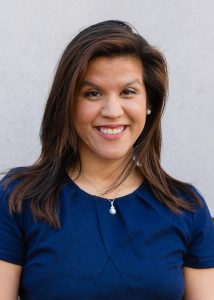By Madeleine O’Neill

There were several inflection points that helped Daniella Prieshoff, J.D. ’12, become the passionate advocate for immigrant survivors of gender-based violence that she is today.
As an undergraduate, Prieshoff took an advocacy and literature class that focused on the legal rights afforded to immigrants and got her reading great civil-rights thinkers.
An internship with a Maryland legislator helped her decide to pursue a career as a lawyer.
And UBalt Law’s Saul Ewing Civil Advocacy Clinic honed Prieshoff’s litigation skills while allowing her to work on cases involving immigrants and migrant workers.
Now, Prieshoff is senior managing attorney at Tahirih Justice Center in Baltimore, a position that allows her to advocate for women and children who have experienced human trafficking, sexual assault, abuse and torture and are eligible for certain immigration protections. It’s a job that has become increasingly difficult during the current immigration crackdown.
Prieshoff’s clients are frightened that they are no longer safe in the United States, even under special programs for crime victims and other groups that have existed for decades. Some are too scared to leave their homes amid raids by U.S. Immigrations and Customs Enforcement agents. And abusers are taking advantage of these fears, threatening to get victims deported if they don’t stay quiet, Prieshoff says.
“These clients are some of the bravest people I know,” she says. “Even though they’re afraid to access these resources and protections, they still insist on reporting crimes, on cooperating with police, on attending these court hearings, testifying in criminal hearings, and exposing their unstable status to the world.”
“They’re still doing that because they believe that they want to live in a safe community, and they want to help make sure other people do, too. So this climate of fear is not helping anybody,” she says.
That climate is particularly challenging for Prieshoff, a naturalized citizen who was born in Ecuador and lived all over the world as the daughter of a military dad. Prieshoff sees this as a double-edged sword: as a Spanish speaker who understands the immigration system, she feels a greater responsibility to serve. But the Trump administration has also targeted immigration attorneys and slashed funding to organizations that help immigrant communities, making the work feel more daunting than ever.
Prieshoff takes comfort in seeing the results of her work. When a client gets a work permit and can finally support her child, or receives asylum after a drawn-out legal battle, it shows that justice is still available.
Prieshoff’s dedication to her clients shows in court, says Lisa Dornell, a former immigration judge and mentor to Prieshoff.
“I could tell she really cared,” Dornell says. “Especially when you’re dealing with such a vulnerable population, as a judge, you want to be certain that the clients are receiving quality advocacy, and she definitely provided that.”
Earlier in her career, Prieshoff worked as a senior attorney at Kids in Need of Defense, representing unaccompanied children in the immigration system, and at Farmworker Legal Services of Michigan. It was there that she realized how many migrant farm workers are subjected to sexual harassment and assault. Being undocumented put them at even greater risk for exploitation, she says. She began seeking a way to do more immigration-related work that encompassed the social dynamics she was seeing.
“I realized that immigration was so crucial to a farm worker or any undocumented person accessing stability and safety, and I realized also that sexual assault was so much more prevalent than we realize,” she says. “I was looking for a way to contribute more.”
The search led her back to the Tahirih Justice Center, and to Baltimore, in 2021. As senior managing attorney, she now has an opportunity to mentor others, like Immigrant Justice Corps Fellow Kimberly Mariano. Mariano said Prieshoff is attentive to her mental health, given the difficult subject matter they deal with at the Tahirih Center, and she allows Mariano to learn on her own while never letting her feel alone in the work.
“The way Danielle mentors specifically, I’ve definitely grown and learned to be more confident in my skills,” Mariano says. “I think a lot of people need that, as well. Having confidence in the work you’re doing, building relationships with other people, and also having confidence in your ability to advocate for your clients.”
Even with the challenges of the new presidential administration, Prieshoff says she sees herself continuing to do this work “for the foreseeable future.”
“Right now it’s a much more challenging time, but I do see that there’s a lot more to fight for and there’s a lot more to believe in that really keeps you motivated,” she says. “I feel like I am really needed, and I feel like I can still contribute more.”
Madeleine O’Neill is a writer based in Baltimore.
